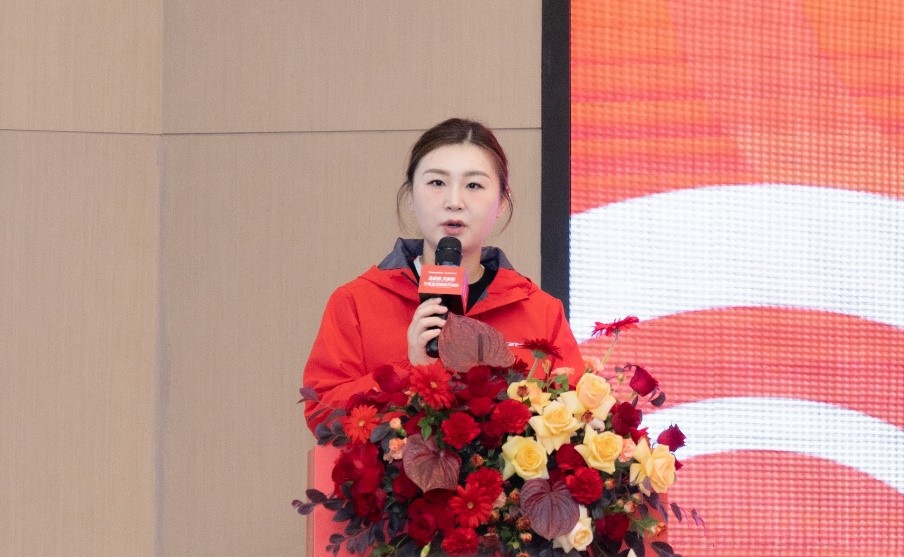Chinese medical device maker Sinocare Inc. unveiled its latest advancements in continuous glucose monitoring (CGM) technology during its global media open day on Nov. 2, stepping up efforts to expand its diabetes management solutions ahead of World Diabetes Day on Nov. 14.
Sinocare's iCan CGM series enables users to track 24-hour glucose curves for 15 consecutive days via Bluetooth-connected smartphone apps. The technology features the company's independently developed third-generation glucose sensor, which Vice General Manager Zheng Jiyun said offers improved accuracy and anti-interference performance.
The platform also integrates artificial intelligence for chronic disease management. Sinocare's proprietary SinoGPT system, combined with the DeepSeek large language model, creates a digital closed-loop system that combines blood glucose monitoring, data analysis and behavioral intervention.
The firm reported strong earnings in in the first three quarters of 2025, with operating revenue reaching 3.45 billion yuan ($476 million). Overseas revenue accounted for 44% of the total in the first half of the year, as the company pursues a strategy to maintain its domestic market share while pushing into new markets abroad.
Sinocare currently ranks as the world’s fourth-largest blood glucose meter enterprise, holding nearly 50% of China's retail market for blood glucose testing and serving more than 25 million users globally.
Africa remains a standout region for the company. Sinocare exports roughly 40,000 blood glucose monitoring devices monthly to the region, where it operates in more than 40 countries, including Egypt, Nigeria, Kenya and Tanzania. The company projects regional sales will exceed 160 million yuan by 2026.

Li Xinyi, vice chairman of Sinocare, delivers a speech at the company’s global media open day on Nov. 2, 2025. [Photo provided to China.org.cn]
Sinocare Vice Chairman Li Xinyi recalled that when the company entered Africa a decade ago, the monitoring penetration rate was below 5%.
"Through continuous technological innovation and market cultivation, we have witnessed a remarkable shift in local health awareness — from testing once every six months to daily monitoring," Li said.
A key aspect of Sinocare's success is a localized market approach. "We focus on creating 'Africa-customized' solutions rather than simply replicating models from China," Li explained. For instance, in response to limited network infrastructure, the company developed a data transmission solution featuring offline storage and scheduled uploads, ensuring reliable monitoring even in low-connectivity environments.
The company has also secured a foothold in North America through its U.S. subsidiary, Tividia Health Inc.. Its TRUE brand products are now sold through various online and offline channels, including Walmart and Amazon, and are available in 55,000 retail pharmacies, such as Walgreens, CVS and Rite Aid, serving over 3 million U.S. consumers.
Sinocare's second-generation CGM products have received EU CE-MDR certification, clearing the way for the company to enter European markets.
To support its global strategy, Sinocare has established nine R&D and manufacturing facilities worldwide, including sites in the U.S. (Fort Lauderdale and Indianapolis) and China (Changsha, Shenzhen, Dongguan and Hsinchu). This global resource allocation enhances the company's market competitiveness while reducing production costs through economies of scale.
Sinocare's global R&D center in Changsha is expected to be fully operational by December 2025, with an investment of 500 million yuan and a footprint of 70,000 square meters. This center will focus on R&D and innovation in biosensing, wearables and high-end implantable medical devices.
The company plans to advance its global expansion through more partnerships with local distributors and additional overseas subsidiaries.
"Through continuous R&D innovation and global expansion, we will ensure that accurate and accessible chronic disease management solutions transcend geographical and resource gaps to serve over 25 million users worldwide and even more patients in need," Li said. "This represents the true value of globalization for Chinese medical device enterprises."


 Share:
Share: 




 京公网安备 11010802027341号
京公网安备 11010802027341号